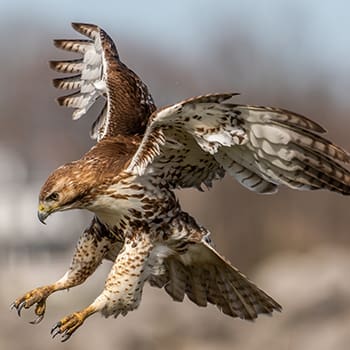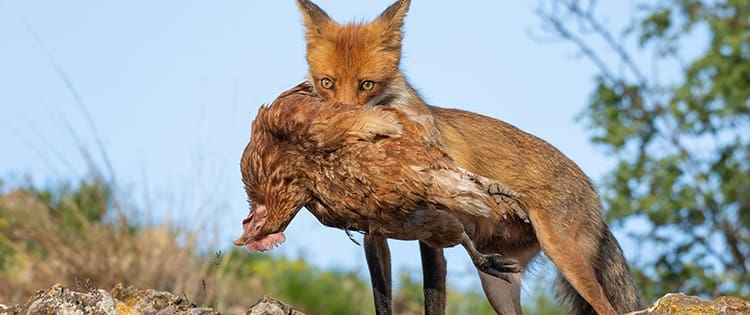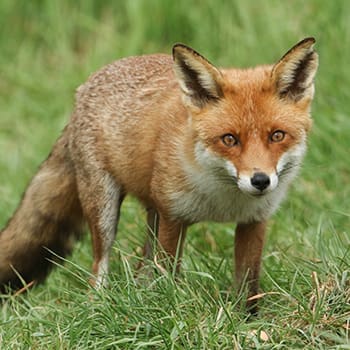Beware, chicken keepers! Something scary is afoot.
There are predators everywhere looking for a nice side of drumsticks; or maybe just your favorite rooster’s head.
Unfortunately, no matter how careful you are with your flock or how tightly you keep them under confinement, you will probably lose a chicken or two to predators over the years. Here, we’ll talk about who those villains are and, in a future article, talk about how to keep your poultry safer than ever. Let’s get started.
From Above
I’m sure the first thing you think of, or perhaps the first predator you were taught about, in this category is a hawk. Indeed, so many pretty chickens get swept up by hawks and other birds of prey that you’re definitely in the right to consider them.
Getting rid of hawks (humanely, legally, without harming the hawk) is usually the best way to deal with them. However, hawks and kites and those birds aren’t your only concern. Owls often predate upon young chickens roosting in the night, chicks, and even older birds that may not be in the best place to sleep. Unfortunately, they may leave you with half of your bird (or everything but the head), too. These gruesome discoveries can be enough to set people off from owning poultry.
Defeat these animals and keep your poultry safe. The majority of “above” predators can simply be removed from being an issue by using good planning and some pre-thought about the position of your coop and what is in that area (ie: don’t put your coop right next to a heavy treeline unless you want to attract predators; keep them closer to the house). You will probably lose poultry your first year or maybe even your second. We are human and we err. All we can do is try. Don’t beat yourself up about it. Learn from it instead.
Worry not. There are a dozen easy ways to keep your birds safe from raptors.
Related: 10 Common Mistakes You Should Avoid If You Want To Raise Chickens
Ground Level
Not so much from raccoons and opossums. In fact, even mesh may not be enough to keep these tricksy beasts out of your enclosure. If you have a nighttime coop that locks tightly and has very solid wood all the way around, well-fed raccoons and opossums likely will not bother with your poultry. They’ll look at other, easier targets and go there instead.
However, if it is cold out and these animals are hungry, they’re coming for your chickens. And they aren’t sorry about it. Raccoons are another one that will tear off the head of your poultry and leave a bloody, tear-jerking mess for you to clean up in the morning. Most opossums carry the whole chicken away and, unless you are very close with your birds or they are a wide variety of coloring and markings, you may end up missing one or two before you notice.
Ground predators are, in my opinion, a much larger threat to chickens and much more likely to go straight through enclosures or be able to smash into them. Dogs, foxes, other livestock, and even humans fit this category. Snakes, too, can easily constrict and kill chicks or eat whole nests of eggs that hens are sitting on.
Snakes, in general, do not hang around except during the egg-laying season. There’s too much risk in those scary, pointy beaks that chickens have and their shiny scales usually attract a lot of attention. However, a brave snake will slither in and swallow down every egg it can find. If this happens, remove the snake as far as you can from your property and place them in a better location; ideally in a rural setting with plenty of ground cover. Never crush the eggs within the snake or attempt to retrieve them. You will kill the snake (cruelly) and this is illegal in many, many states if the snakes are nonvenomous.
Related: How To Identify The Venomous Snakes On Your Property
Dogs, foxes, and other canids are usually more interested in hoofstock than they are in chickens that are being kept in a pen. However, if you free-range your chickens, you have a very high chance of losing one or two to dogs or foxes in most areas. While foxes are hunting, most pet dogs have no idea what they’re doing and simply see a neat, loud, flappy friend. Much like their toys at home, this thing makes all sorts of noises and is a great fun thing to play with!
Except not so much for you when you find your yard covered in feathers and a lot of sad memories.
Try not to blame the dogs and dog-proof your free-ranging area. Or, and this is our favorite method, put your chickens in a secure tractor to free-range safely. You can move it every day and this allows them to enjoy their freedom while still in safe confines.
Other livestock, such as horses, cattle, or rams and bucks, may not feel as chummy with the chickens as you do. They are much more likely to attack or stomp these animals and poultry are very, very delicate. However, keeping both parties safe is as easy as not allowing the chickens to wander into these pens or pastures.
People, perhaps, are the worst predators of them all. They may steal your chickens because they want fresh eggs or kill them simply out of spite. Or because your chickens have free-ranged to their property and are digging in their gardens or worse; tearing up crops.
Final Thoughts
Chickens are not as well-loved and tolerated by everyone as they are by us. If you have chickens that wander, it is best to ask local neighbors if that’s okay with them. If it isn’t, take measures to secure your animals before the humans around you and make sure that they are no longer a problem (“problem”) in their opinion.
Ultimately, chickens are small prey animals that do a lot of scavenging and predating on insects and much smaller mammals. They are constantly under threat and if at all possible, a good rooster who screams the alert when an actual threat approaches is worth his weight in gold. I realize that having roosters may not be possible for everyone, but if you can have them; you absolutely should.
Take care of your chickens as best you can and learn from any losses that happen. Don’t assume that just because you had a loss you’re an unfit chicken keeper; just fix the problem that caused the loss. It’s how we get better and how our flocks improve over time.
Do you have any questions, comments, or concerns about chicken predators? Having a huge problem with them yourself and looking for help? Comment down below and we’ll see what we can do for you! As always, Happy Chicken Keeping! We look forward to hearing from you real soon.
You may also like:
Ingenious Ideas For Taking Care Of Your Chickens
An Ingenious Eggshell Remedy and 25 Others Made from Things People Usually Throw Away (Video)











We have an offer on a small property, 3.64 acres, fully fenced, good chicken coop. Coop will need enclosure as its wire with roof, and moved closer to house, built 1950. Best size coop, nesting boxes? Yard, enclosed, overhead too? Huge fenced yard, rest of property is fenced woods. What is ideal ratio of hens to roosters? This is in mountains, about 2K up, some snow. Best chickens? My guess is zone 6. Neighbors, none seen. Our first property of note – we are active seniors.